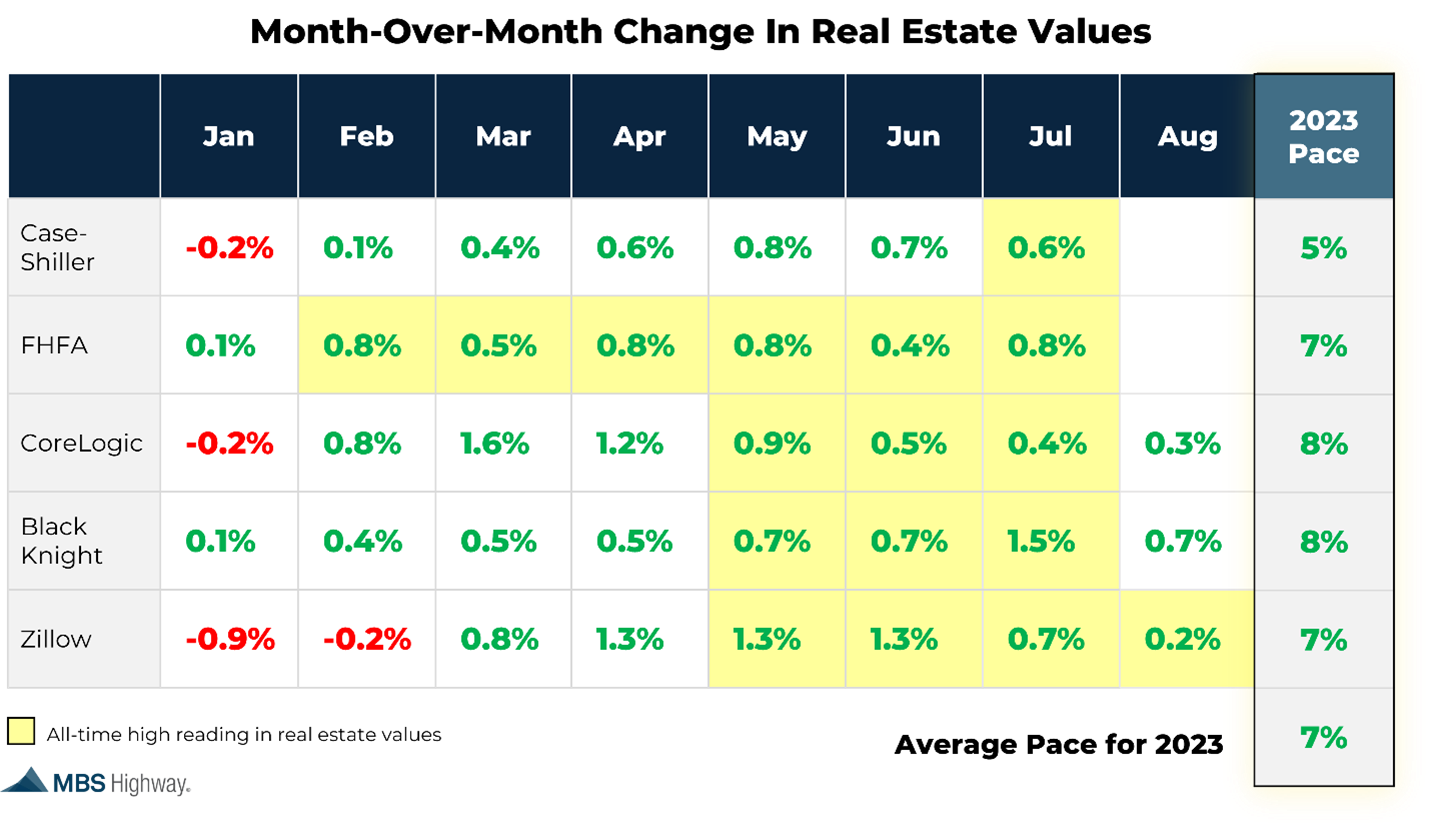Why Zillow says Fall 2023 is a Homebuying "Sweet Spot"
Most people grow up dreaming of owning a home someday, escaping the cloud of rising rents and building wealth through home equity. However, with the recent surge in home prices, you may be wondering if this is the smartest move today. With home prices so high, is it worth buying a home? Or is it safer to continue renting right now?
In the latest survey from Fannie Mae measuring housing sentiment, 82% of respondents said now is a bad time to purchase a house — a record high. That’s up from 78% in June. Only 18% percent of people think now is a good time to buy a home.
However, despite the higher homebuying costs, Zillow thinks it's a good time to buy if you have the budget. And we agree!
How is the Market Different Now?
Zillow's assessment that Fall 2023 is a "sweet spot" for homebuyers is based on the fact that a larger proportion of sellers are relenting on their asking prices.
Zillow's research shows that 9.2% of home listings saw a price cut in the week ending September 16 — the highest share since November.
But it's not just about the price. Buying a home at the end of 2023 also means you have more choices than you did over the last few years. There are more motivated sellers and more active listings overall than any time since last December.
Usually, home listings decrease as the summer ends. This year, however, August saw a bump in new listings compared to July.
Even though inventory is increasing, home values are still projected to rise. Zillow predicts prices to continue upward through the first half of 2024, saying prices could jump as much as 5% by next August - and that estimate is on the low end compared to the trajectory of appreciation we've seen so far this year.

The Benefits of Buying Right Now
Buying a home today means more room for negotiation on price and more options to choose from, but those are just two of the several ways you benefit by buying a home sooner rather than later.
1. Building Equity
Buying a home means you are investing in your future. When you own a home, your wealth grows in two ways at once:
Principal Reduction
From day one, part of your mortgage payment goes directly toward paying down the balance of your loan. This is essentially paying yourself, as every principal payment increases the equity you have in your home.
Yes, buying a home with a mortgage means you also pay interest, but the amount of interest you pay decreases over time and the amount of principal increases. When you rent, 100% of your money is going to pay someone else's mortgage.
Appreciation
While you are paying down your mortgage balance every month, your home value is also increasing. This is FREE money! And when you look at it as a return on your investment, the wealth gains are astronomical.
Appreciation is calculated based on the total value of your home, not just the amount of cash you invested in it (i.e., your down payment).
Look at it this way: if you bought a $400,000 home today with 3% down - which is the minimum allowed for a conventional loan - you could expect to pay around $18,000 out of pocket between your down payment and closing costs.
Zillow says home values could easily increase by 5% over the next year. If that happened, your home would be worth $420,000 - that's an 111% return on your initial cash investment!
2. Stable Monthly Payment
If you finance your home purchase with a fixed-rate mortgage loan, you will know the precise amount of your principal and interest payments for the life of the loan. This long-term predictability fosters financial stability.
If you rent, you'll have much more difficulty accurately predicting your monthly rent for years to come. You will be at the whim of your landlord and the rental market every year.
According to ipropertymanagment.com, average rent prices have increased 8.85% per year since 1980. You may be able to rent a home cheaper than you can buy one right now, but in a few years your housing payment will likely be higher than it would be had you locked in a fixed mortgage payment today.
A fixed housing payment provides considerable financial peace of mind. You are also likely to earn more money in the future, which means your principal and interest will dwindle relative to your overall budget.
3. Tax Incentives
The United States tax code heavily benefits property owners. The IRS has extensive rules about the tax breaks available for homeowners, and the ones you choose/are eligible for will depend on a variety of factors.
Here are a few of the tax breaks you may be able to take advantage of after your home purchase.
- Mortgage Interest. Many homeowners can deduct what they paid in mortgage interest when they file their taxes each year. You can deduct interest paid on up to $750,000 of your mortgage, or $375,000 if you’re married and filing separately.
- Mortgage Points. If you bought points on your mortgage, that entitles you to similar tax deductions, because the IRS sees it as mortgage interest.
- Property Taxes. The IRS offers tax deductions on income, sales, and property taxes for most homeowners of up to $10,000 total, or $5,000 if married and filing separately.
- Residential Energy Credits. If you install alternative energy equipment to make your home more efficient, such as solar panels, you might be able to claim a residential energy credit for it.
4. Lifestyle Stability
Homeownership means you are the boss and can control your lifestyle and family decisions. If your kids are in public school and you don't want to risk having them change schools because your landlord doesn't renew your lease, owning a home would remove much of the risk of having to move.
Do you have pets you don't want to part with? Do you love gardening or redecorating? Need a place to store your boat?
As a homeowner, you can more easily enjoy these leisure activities without worrying about logistics or restrictions.
Make Your New Home Even More Affordable with a Rate Buydown!
Buying a home today means you could get a break on price, which is great. But if you want to make your new mortgage payment as affordable as possible, there's a better way to use your negotiating power.
Instead of asking for a price reduction, ask that the seller give you concessions to temporarily lower your mortgage payment for the first few years. You might have heard this strategy be called a "temporary rate buydown" or a "2/1 buydown", and it is hands down the best way to combat higher mortgage rates today.
Using seller credits in this way essentially lowers the interest rate on your mortgage for the first few years, consequently reducing your monthly mortgage payment by hundreds of dollars every month. Often, this strategy ends up costing considerably less for the seller than lowering the price would be, and the home value gets to remain high.
And the best part? If market rates fall before your buydown funds are used up, the remaining funds can be applied to the cost of your refinance. This could mean you end up locking in a permanently lower rate with NO additional charge.
If you would like to see how much more a rate buydown would save you today compared with a price reduction, fill out the form below to request a mortgage discovery consultation with one of our experienced mortgage advisors.



NMLS Consumer Access #150953
All Rights Reserved | Luminate Home Loans, Inc
Luminate Home Loans, Inc. a wholly owned subsidiary of Luminate Bank
NOTICE TO TEXAS CONSMERS: CONSUMERS WISHING TO FILE A COMPLAINT AGAINST A MORTGAGE BANKER OR A LICENSED MORTGAGE BANKER RESIDENTIAL MORTGAGE LOAN ORIGINATOR SHOULD COMPLETE AND SEND A COMPLAINT FORM TO THE TEXAS DEPARTMENT OF SAVINGS AND MORTGAGE LENDING, 2601 NORTH LAMAR, SUITE 201, AUSTIN, TEXAS 78705. COMPLAINT FORMS AND INSTRUCTIONS MAY BE OBTAINED FROM THE DEPARTMENT’S WEBSITE AT WWW.SML.TEXAS.GOV. A TOLL-FREE CONSUMER HOTLINE IS AVAILABLE AT 1-877-276-5550. THE DEPARTMENT MAINTAINS A RECOVERY FUND TO MAKE PAYMENTS OF CERTAIN ACTUAL OUT OF POCKET DAMAGES SUSTAINED BY BORROWERS CAUSED BY ACTS OF LICENSED MORTGAGE BANKER RESIDENTIAL MORTGAGE LOAN ORIGINATORS. A WRITTEN APPLICATION FOR REIMBURSEMENT FROM THE RECOVERY FUND MUST BE FILED WITH AND INVESTIGATED BY THE DEPARTMENT PRIOR TO THE PAYMENT OF A CLAIM. FOR MORE INFORMATION ABOUT THE RECOVERY FUND, PLEASE CONSULT THE DEPARTMENT’S WEBSITE AT WWW.SML.TEXAS.GOV.”



